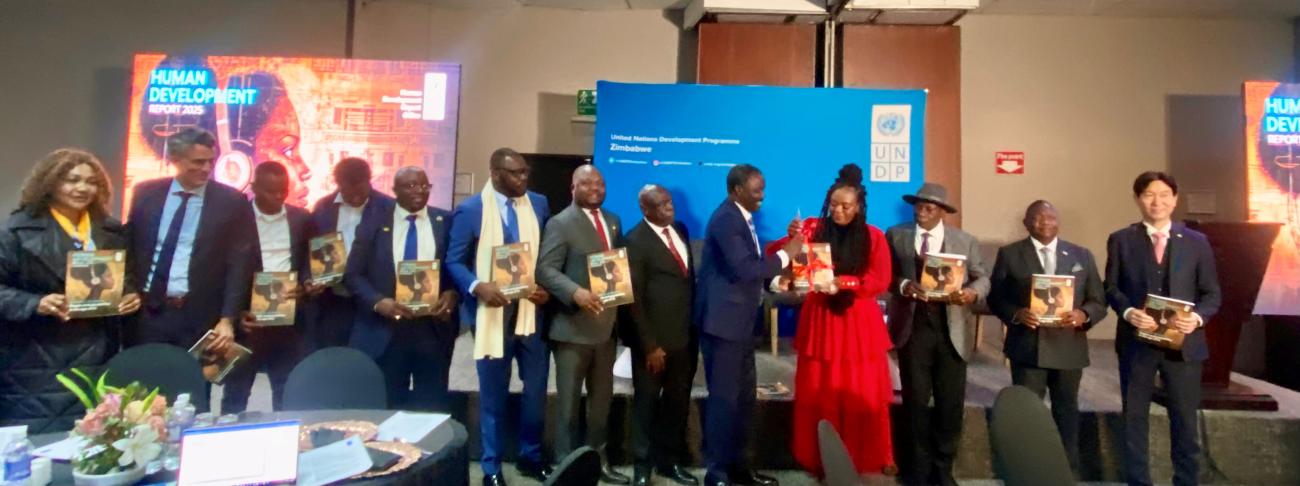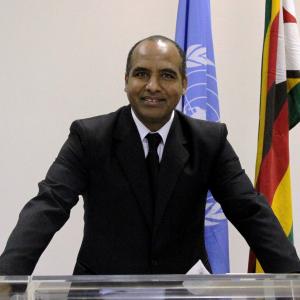The United Nations Development Programme (UNDP) on 18 June unveiled its 2025 Human Development Report, titled "A Matter of Choice: People and Possibilities in the Age of AI." The report emphasizes the need to strategically harness artificial intelligence (AI) for inclusive and sustainable development. The launch event featured remarks from senior Government, UN and European Union officials, including Honorable Tatenda Mavetera, Mr. Edward Kallon, Dr. Ayodele Odusola, and Mr. Franck Porte, along with a vibrant panel discussion that included insights from AI experts and the passionate perspectives of young voices.
The 2025 Human Development Report paints a vivid picture of a world on the brink of transformative technological evolution. While AI presents unparalleled opportunities to enhance human capabilities, it also risks widening socio-economic disparities. The report calls for intentional choices to ensure that AI benefits everyone, advances human development, and does not intensify existing inequalities.
Findings highlight stagnation in human development metrics, intensified by global setbacks like the COVID-19 pandemic. AI stands at a crucial intersection; it could divide further or inspire a renaissance, depending on today's actions. There is a crucial reminder that technology should reflect and uphold societal values, serving humanitarian objectives and bridging developmental disparities.
UNDP Administrator Achim Steiner's message permeates the report, emphasizing resilience amid technological change. AI's promise is linked to the urgent need for investment in human capabilities. The clear recommendations suggest fostering an economy where AI complements human efforts, driving innovation with societal benefits in mind, and equipping citizens with skills suitable for an AI-driven era.
Honorable T. Mavetera, Zimbabwe's Minister of Information Communication Technology, Postal and Courier Services, contextualized the report, highlighting Zimbabwe's progress in digital transformation. AI is pivotal in the national strategy to become an upper-middle-income nation by 2030. Her emphasis was on human-centered AI, closing digital divides, and building collaborations for sustainable tech incorporation.
Mr. Edward Kallon, UN Resident and Humanitarian Coordinator, linked AI to pivotal pathways for achieving Zimbabwe's Sustainable Development Goals (SDGs). He envisioned AI as a driver of inclusivity, innovation, and reform in vital sectors like agriculture and education, while addressing emerging ethical and governance issues.
Highlighting a rights-based approach to AI, Mr. Franck Porte, EU Head of Development Cooperation, emphasized the EU's commitment through initiatives like the AI Act and Global Gateway strategy to support inclusive and ethical digital transformation globally.
The launch highlighted a collective effort's necessity to shape a future where AI empowers rather than excludes. The dialogue was a potent reminder that the path to a fair and prosperous AI-enhanced world is built on informed decisions, inclusive policies, and resilient systems aligned with human values.
Dr. Ayodele Odusola, UNDP Resident Representative in Zimbabwe, stressed the vital dialogue initiated by this report, urging a collective vision for how societies aim to utilize AI. He advocated for incorporating AI into a developmental framework that empowers all community sectors, urging Zimbabwe to embrace AI for catalytic growth.
The report underlines the urgency of mobilizing human creativity to reshape economies and societies to fully leverage AI while ensuring it serves humanity's best interests. It encourages policymakers to move beyond unhelpful narratives and empower human agency within AI design and deployment strategies.
Ms. Ethel Bangwayo, UNDP Economist and Team Leader Prosperity Unit presented the findings of the HDR which include stalled progress in human development, with recovery from the impacts of the COVID-19 pandemic uncertain. AI, at a crossroads, presents both risks and opportunities: fostering unity or reinforcing divides depends on deliberate choices. A people-centric (as opposed to a technology-driven approach) is crucial, placing humans at the forefront of determining technology's progression and service. The overlapping global crises beckon a shift from viewing technology as the sole solution to addressing underlying systemic barriers. For tangible improvements, a reorientation towards making different choices is critical. As is the use of AI to augment productivity and accelerate development.
Key recommendations advocate for building a complementary economy, prioritizing intentional innovation, and investing in essential skill development. The discussions affirmed that future considerations must transcend technological advancements to craft a world that elevates human dignity and potential.
The message from the remarks, panel and plenary discussions were unambiguous: the future is not just about technology; it is about crafting a technologically enhanced world that respects and elevates human life. The 2025 Human Development Report implores us to seize this moment of choice to shape an inclusive and intelligent tomorrow—for Zimbabwe and beyond.














